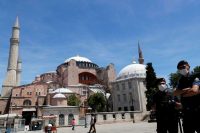El renacer de la libertad religiosa en EE.UU.
La libertad religiosa ha vuelto a despertar en Estados Unidos en la última década de la mano de su Tribunal Supremo, la misma institución constitucional que, años antes, había puesto contra las cuerdas su libertad más preciada y fundamental. Regulada escuetamente la libertad religiosa en la Primera Enmienda (de 1791), esta garantiza que el Congreso no podrá promulgar ninguna ley que establezca una religión oficial (Cláusula de No-Establecimiento) o prohibir la libre práctica de una religión en particular (Cláusula de Libre Ejercicio). Esta Enmienda protege también la libertad de expresión, de prensa, de reunión, y el derecho de solicitar al gobierno compensación por agravios.… Seguir leyendo »














